Does Creatine Increase Testosterone?
Written by Ben Bunting: BA, PGCert. (Sport & Exercise Nutrition) // British Army Physical Training Instructor // S&C Coach.
--
If you're a man, you may be wondering - Does creatine increase testosterone? We'll discuss the benefits of creatine, the side effects and how to take creatine supplements on training days. Here's what you need to know. In a study conducted in 2006, scientists studied the effects of creatine, as well as a muscle enhancer known as beta-alanine. The researchers recruited 33 men and randomly assigned them to one of three groups: one that received placebo or a creatine and beta-alanine supplement. The researchers found that creatine supplementation improved muscle power, which could result in a greater ratio of DHT to erectile hormones.
Creatine increases testosterone
Creatine increases testosterone and DHT during physical activity but does not increase these hormones during rest. DHT is the active form of testosterone that helps muscles "fire" and is then flushed out after activity. While creatine indirectly enhances muscle power, it also helps with recovery and growth hormone. This is just one of the many ways creatine may increase testosterone levels. This substance is often added to sports supplements for its countless benefits.
One recent study analyzed the effects of creatine on serum testosterone and DHT levels in college-aged rugby players. The creatine-supplemented group increased DHT levels by 56 percent after seven days and remained at that level for the rest of the study. This result was not replicated in any other study, however. Furthermore, it was not clear whether creatine would improve testosterone levels during the maintenance phase. However, the creatine-supplementation group had higher levels of testosterone than the control group, and the difference was not significant.
Side effects of creatine
While there are some side effects associated with creatine, it has a positive impact on testosterone levels in a number of ways. It increases physical strength during a workout and may be an effective part of a comprehensive wellness regimen when taken under the supervision of a hormone specialist. However, men suffering from male pattern baldness should avoid it, as testosterone levels decrease when it is present in the blood. This is due to a genetic sensitivity to DHT.
While it may appear that creatine does not affect testosterone levels, it is important to remember that it elevates DHT and growth hormone during physical activity, but it has no effect on hormonal concentrations at rest. DHT is the active form of testosterone, and it is responsible for "firing" muscles. It then flushes away once the exercise is finished. Creatine works by indirectly influencing the levels of these hormones during exercise and helps athletes recover more quickly.
Taking creatine on training days
Many men and women take creatine on their training days, but not everyone sees the benefits. It doesn't raise testosterone levels, but it can increase energy levels. Unlike testosterone, creatine is a natural amino acid found in the body. It improves exercise performance and strength. This supplement can also help women boost their testosterone levels. It's important to note that creatine is not a steroid or dangerous synthetic drug.
One study showed that creatine supplementation increased 1-rep max bicep curl and max squat strength. Other research indicated that creatine increased total workload, six-second sprint performance, and bench press reps. It also improved muscle mass and biceps strength. However, creatine should only be used by athletes who train at high intensity. People who train regularly can also benefit from the supplement.
Ways to take creatine
Creatine has a multitude of uses and can be added to any testosterone replacement therapy regimen. The benefits include increased energy and sex drive, improved body composition, and increased mood and cognition. Creatine is an effective supplement in reducing baldness and improving sexual performance. For many men, it is a necessary part of testosterone replacement therapy, but not all men will benefit equally from its effects.
Creatine has become a common muscle-building supplement. It comes in capsule, powder, and pre-made shakes, but many guys are unaware of its benefits. If you're looking to increase testosterone naturally, creatine may be an excellent option for you. Listed below are several ways to take creatine to increase testosterone:
Seven Ways to Take Creatine
If you want to increase the amount of creatine in your muscles, you should consider taking creatine. The correct dosage is 0.1 grams of creatine per kilogram of body weight a day. Some athletes, however, recommend loading the first week of creatine intake with 0.3 grams per kilogram of body weight. It's important to follow a consistent creatine intake during this period of time or the effects of creatine may be negligible. Keep in mind that your body functions in 28-day cycles.
You can increase the amount of creatine in your body by consuming foods rich in creatine. For example, eating plenty of fruits and vegetables and consuming dairy products will increase your intake. Moreover, simple carbohydrates such as yogurt, bread, and other dairy products stimulate the release of insulin, which drives substances into muscle cells. However, creatine concentration must be high for insulin to have any effect. In addition, you need to take more than a few grams of a quick-digesting carbohydrate to experience the benefits.
Another way to take creatine is by taking it as a supplement. This supplement helps muscles work harder by replenishing ATP, the energy currency in the muscle cells. Creatine combines with phosphate molecules to produce phosphocreatine, which plays an integral role in energy metabolism. It is especially useful for boosting the body's energy levels during intense bursts of energy. When taken in appropriate amounts, creatine can help athletes improve their performance.




